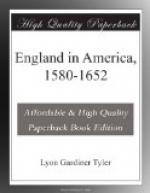In June, 1632, Charles I. so vacillated as to grant Maryland, within the bounds of “their ancient territories,” to Lord Baltimore, regardless of the protest of the Virginians; and April 28, 1634, he revoked the liberal commission of 1631, and appointed another, called “the Commission for Foreign Plantations,” composed almost entirely of opponents of the popular course of government, with William Laud, archbishop of Canterbury, at the head. This commission had power to “make laws and orders for government of English colonies planted in foreign parts, to remove governors and require an account of their government, to appoint judges and magistrates, to establish courts, to amend all charters and patents, and to revoke those surreptitiously and unduly obtained."[42]
Harvey’s conduct in Virginia reflected the views of the court party in England. He offended his council by acting in important matters without their consent, contrary to his instructions; and showed in many ways that he was a friend of the persons in England who were trying to make a monopoly of the tobacco trade. He attempted to lay taxes, but the assembly, in February, 1632, re-enacted the law of 1624 asserting their exclusive authority over the subject.[43] At the head of the opposition to Harvey was William Claiborne, the secretary of state, who opposed Lord Baltimore’s claim to Maryland, and, in consequence, was in the latter part of 1634 turned out of office by Harvey, to make way for Richard Kempe, one of Lord Baltimore’s friends.
The people of Virginia began in resentment to draw together in little groups, and talked of asking for the removal of the governor; and matters came to a crisis in April, 1635, when Harvey suppressed a petition addressed to the king by the assembly regarding the tobacco contract, and justified an attack by Lord Baltimore’s men upon a pinnace of Claiborne engaged in the fur trade from Kent Island. At York, in April, 1635, a meeting of protest was held at the house of William Warren.
Harvey was enraged at the proceeding and caused the leaders to be arrested. Then he called a council at Jamestown, and the scenes in the council chamber are interestingly described in contemporary letters. Harvey demanded the execution of martial law upon the prisoners, and when the council held back he flew into a passion and attempted to arrest George Menifie, one of the members, for high-treason. Captain John Utie and Captain Samuel Matthews retorted by making a similar charge against Harvey, and he was arrested by the council, and confined at the house of Captain William Brocas. Then the council elected Captain John West, of Chiskiack, brother of Lord Delaware, as governor, and summoned an assembly to meet at Jamestown in May following. This body promptly ratified the action of the council, and Harvey was put aboard a ship and sent off to England in charge of two members of the House of Burgesses.[44]




